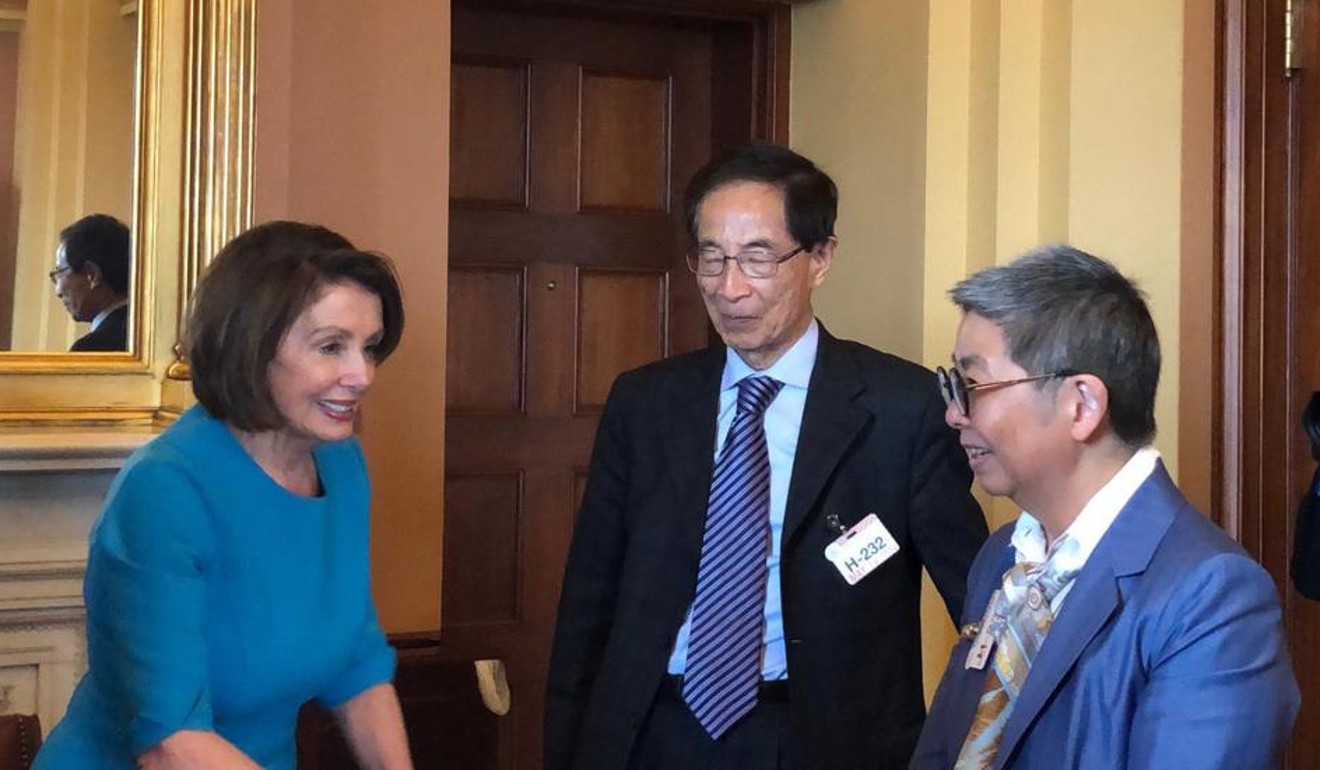
US Secretary of State Mike Pompeo weighs in on Hong Kong extradition bill and expresses concern about new legislation which ‘threatens rule of law’
- Pompeo makes comments in meeting with pro-democracy delegation from city, led by Martin Lee

Hong Kong’s controversial extradition bill prompted US Secretary of State Mike Pompeo to express concern about the legislation on Thursday, which he said threatened the city’s rule of law.
Pompeo’s remarks came after he met a delegation of Hong Kong pro-democracy advocates, led by Martin Lee Chu-ming in Washington to discuss the status of Hong Kong’s autonomy under the “one country, two systems” framework.
“Secretary Pompeo expressed concern about the Hong Kong government’s proposed amendments to the Fugitive Ordinance law, which threaten Hong Kong’s rule of law,” the State Department said.
“He also expressed support for Hong Kong’s long-standing protections of human rights, fundamental freedoms, and democratic values, which are guaranteed under the Basic Law.”

In Beijing, foreign ministry spokesman Lu Kang urged the US to respect the Hong Kong government’s legislative amendment, adding that no other countries, organisations and individuals had the right to interfere.
“It is wrong to interfere with Hong Kong affairs and futile to try and take advantage of the situation by creating chaos in the city,” Lu said.
The proposed bill could better help Hong Kong develop fugitive arrangements and mutual legal assistance agreements with other countries, and hence, combat criminals and uphold the rule of law, he added.
“The central government firmly supports the Hong Kong administration on the legislation,” Lu said.
The delegation comprised Lee, student activist Nathan Law Kwun-chung, long-time journalist Mak Yin-ting, and former Legislative Council member Lee Cheuk-yan.
They testified before the US Congressional-Executive Commission on China, a bipartisan commission that monitors Beijing’s actions on human rights and its commitment to the rule of law.
At the hearing, the delegation warned of the dire consequences the bill would bring not only to Hong Kong, but also to the US and other nations.
Those concerns struck a strong chord with US lawmakers, who vowed to produce a bipartisan joint statement to protest against the extradition law in the coming weeks.
The bill would allow the transfer of fugitives from Hong Kong to jurisdictions with which the city has no extradition deal, including mainland China.
Lee Cheuk-yan told the Post the meeting lasted for 30 minutes and Pompeo listened to them very carefully.
“He said he was very concerned about the negative impacts the extradition law would have on Hong Kong,” Lee Cheuk-yan said. “He said he would follow up with actions, but did not specify what actions will be taken.
“The mere fact that Pompeo was willing to meet us is a clear signal that the US is paying very close attention to the extradition law.”
The delegation will meet with Massachusetts Congressman Jim McGovern, the chairman of the Congressional-Executive Commission on China. They had previously met with the US Chamber of Commerce, the House Speaker Nancy Pelosi, and the US Ambassador-at-large for international religious freedom Sam Brownback.
On Friday morning, the city’s sole member of China’s top legislative body Tam Yiu-chung said it was unwise to seek support from abroad over the issue, especially amid the backdrop of the ongoing trade war between the US and China.
“The trade war is not an easy problem to solve. It is stupid to travel there to bad-mouth Hong Kong or to seek support,” the National People’s Congress Standing Committee member said on a radio programme.
“We will become someone’s chess piece in the storm. The democrats should not go there and be utilised.”
Beijing’s representatives in Hong Kong have come out in open support of the bill and are working alongside the city’s government to mobilise and rally pro-establishment politicians to their side.
The central government’s liaison office in the city has urged the public not to heed rumours spread by the bill’s detractors, while Hong Kong and Macau Affairs Office director Zhang Xiaoming called for rational debate as he met a local delegation on Wednesday.
Chief Executive Carrie Lam Cheng Yuet-ngor also made it clear on Thursday she would not shelve her controversial extradition bill under pressure, insisting it was her call and Beijing was not making it mandatory by wading into the political row.
Tam said the government could consider narrowing the scope of the bill to ease worries in society.
“If the suggestions are reasonable and practical, I think the government should consider them,” he said.
Tam also believes if the bill passes, authorities on the mainland would not casually ask Hong Kong for a fugitive, thereby putting the chief executive in a difficult position.
He suggested a specific authority, such as the Supreme People’s Procuratorate, should handle all extradition requests made by other provinces, so as to avoid abuse of the system.
Some pro-establishment lawmakers have been pushing for the government to circumvent the bills committee and send it directly to the full council, as the bill has triggered unprecedented clashes in Legco between the two camps. Tam said it would still fit the rules of procedure.
The House Committee will meet on Friday to discuss the fate of the bills committee, which was set up to scrutinise the legislation, but the process was stalled because of the tussle between the rival factions.
Chairwoman Starry Lee Wai-king said earlier that she had not officially received notice to that effect from the government, which would have the authority to skip the bills committee stage.
The liaison office also had called a meeting with 36 local deputies to the NPC and about 200 delegates to the CPPCC on Friday afternoon to discuss an “important item”. The meeting was expected to focus on the bill.
Additional reporting by Nectar Gan in Washington